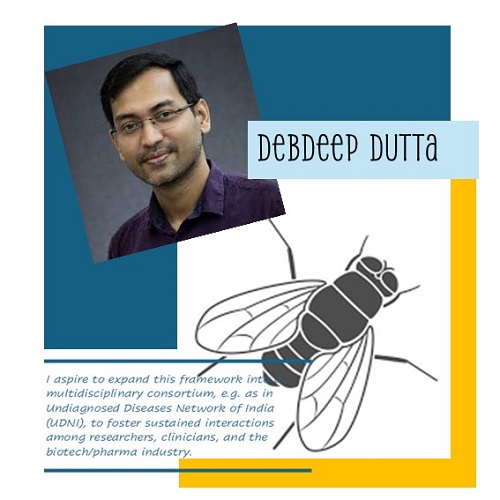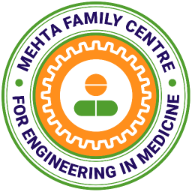
In conversation with....
Dr. Debdeep Dutta
Assistant Professor Department of Biological Sciences and Bioengineering and the Mehta Family Centre for Engineering in Medicine.
Research Interest: Genetics, Cell signaling, Mitochondria, Rare diseases, Neurological disorders
MFCEM: Hello Dr Dutta, welcome to IIT Kanpur, it is great to have you here. A major focus of your research program is to understand rare/undiagnosed genetic diseases using 'humanized' fruit flies as a model system —what drew you to take up this rather challenging area of research?
Dr. Debdeep Dutta: Thank you. My interest in genetic diseases began during my master’s program, where I majored in molecular and human genetics. During that time and later in my PhD, I learned how to use fruit flies (Drosophila melanogaster), the "queen of genetics", to uncover the intricacies of cellular and developmental biology. Subsequently, during my postdoctoral tenure at Baylor College of Medicine, I had the opportunity to integrate my training in both fly and human genetics to address one of the most pressing challenges in modern medicine: undiagnosed genetic diseases.
Globally, over 350 million people are affected by genetic disorders, with at least 70 million in India alone. Around 60% of these individuals remain undiagnosed for years, sometimes for their entire lives. While working with multiple patient families affected by these conditions, I witnessed their prolonged emotional, psychological, and financial sufferings that come from living in diagnostic uncertainty. A major challenge in diagnosing these cases is to confirm whether a suspected gene variant is truly disease-causing.
This is where ‘humanized’ fruit flies offer a quick and cost-effective solution. By engineering flies to carry patient-derived gene variants, we can test their functional impact, providing a timely diagnosis.
….Globally, over 350 million people are affected by genetic disorders, with at least 70 million in India alone. Around 60% of these individuals remain undiagnosed for years……..
From a scientific standpoint, this field is a goldmine for geneticists and biomedical researchers, as most of the rare/undiagnosed disease-causing genes are poorly characterized. Increasing evidence suggests that many of them are potentially linked to other common diseases. It is this combination of scientific curiosity and the potential to make a real difference in people’s lives that drew me to this challenging but rewarding area of research.
MFCEM: How do you hope to create a mark in the global and national research fraternity dedicated to tackling rare genetic disorders?
Dr. Debdeep Dutta: Collaboration is the key to solving the complex medical mysteries posed by rare genetic disorders. These complex conditions require the collective expertise of clinicians, medical geneticists, bioinformaticians, and model organism researchers. I look forward to building strong, interdisciplinary collaborations both nationally and globally to tackle these challenges together. Matchmaking platforms like ‘GeneMatcher’ and ‘ModelMatcher’ play a crucial role in connecting clinicians and researchers with complementary expertise and shared interests. I engage with these networks. In India, I have been in contact with clinicians who are experts in the field of rare genetic diseases and are working on unresolved cases. Hopefully, through collaboration and research innovation, I could make a meaningful contribution in the global and national rare disease research community.
MFCEM: The need to forge meaningful interdisciplinary collaborations—particularly in Biomedical sciences—among basic biologists, data scientists, clinicians, and the biotech/pharma industry has resulted in a tectonic shift in our approach to finding solutions to medical problems. How do you foresee building a diverse research team, could you share some of your long- and short-term research goals?
Dr. Debdeep Dutta: Advancing translational research, especially in the context of genetic diseases, requires the integration of expertise from diverse fields such as basic biology, clinical medicine, engineering, data science, and the biotech/pharma industry. I envision building a research team that brings together experts with complementary skills and shared commitment to solving medical challenges. Also, I am driven to mentor young researchers across disciplines and foster an inclusive research environment.
I aspire to expand this framework into a multidisciplinary consortium, e.g. as in Undiagnosed Diseases Network of India (UDNI), to foster sustained interactions among researchers, clinicians, and the biotech/pharma industry.
In the short term, my goal is to establish a strong collaborative network with Indian clinicians and medical geneticists to access patient data and biological samples. At the same time, I aim to team up with data scientists and bioinformaticians to analyse genomic datasets and prioritize candidate variants.
In the lab, we plan to use fruit flies and cellular models to functionally validate patient-derived gene variants and investigate the molecular mechanisms of disease pathogenesis. By integrating computational predictions with experimental validation, we hope to shift how genetic diseases are approached, bridging the gap between discovery and clinical application.
In the long term, I aspire to expand this framework into a multidisciplinary consortium, e.g. as in Undiagnosed Diseases Network of India (UDNI), to foster sustained interactions among researchers, clinicians, and the biotech/pharma industry. One of our major goals is to explore drug repurposing strategies for managing these genetic conditions. Drug repurposing offers a relatively fast and impactful solution, especially in resource-limited countries like India. Using ‘humanized’ fruit flies and patient-derived cells, we aim to perform high-throughput drug screening to identify potential and personalized therapeutic candidates. Additionally, we will investigate the broader implications of rare disease-causing genes in more common diseases.
MFCEM: How does being part of IIT Kanpur at large, and the Mehta family school of Engineering in Medicine in particular help accelerating your research and broaden the translation possibilities of your research outcomes?
Dr. Debdeep Dutta: I am truly excited to be part of IIT Kanpur (IITK), an institution renowned for its academic excellence, interdisciplinary research, and state-of-the-art infrastructure. The collaborative culture across departments in IITK offers a unique opportunity to engage with experts from both basic science and engineering disciplines. Notably, the Gangwal School of Medical Sciences and Technology (GSMST) at IITK, is expected to accelerate my research in disease biology by promoting integration between clinical and biomedical sciences.
My association with the Department of Biological Sciences and Bioengineering (BSBE) and the Mehta Family Center for Engineering in Medicine (MFCEM) enables me to bridge the gap between fundamental research and real-world applications. The Center’s focus on integrating engineering and medicine, e.g. in the areas like molecular medicine, aligns well with my research interest. Access to cutting-edge core facilities, advanced research technologies, and a vibrant research community here provides a fertile ground for the growth of my research program. Altogether, the research ecosystem potentially enhances the translational impact of my research and enables me to contribute more effectively to national and global efforts in addressing genetic diseases.
MFCEM: Thank you Dr. Debdeep for sharing your thoughts with us, and wishing you success in your research.

